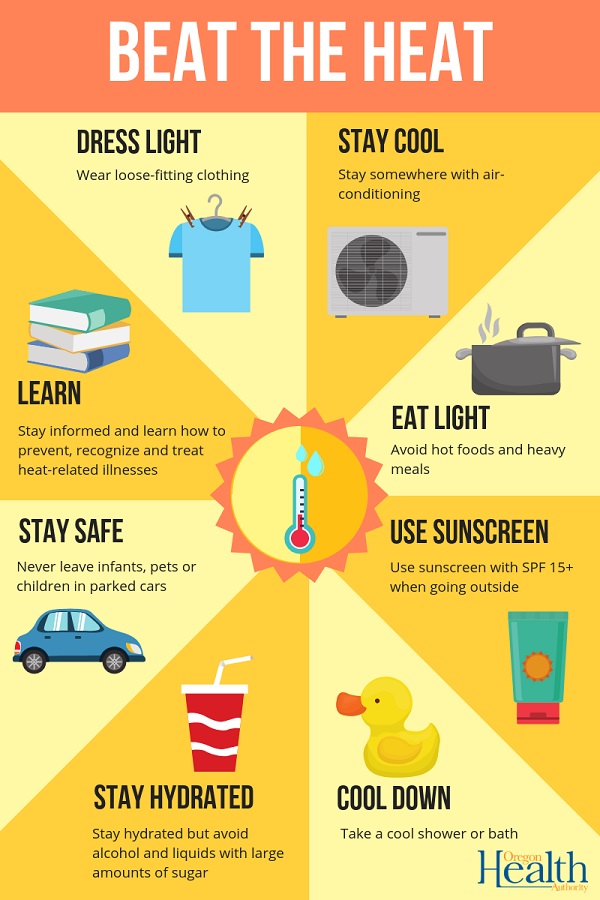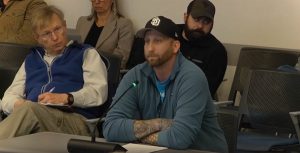Excessive heat can be deadly
7 min read
A new public health threat for Oregon: excessive heat. It’s a lot more complex than freezing weather and requires new tools. Presenting to the COAD (Community Organizations Active in Disaster) June 13, from Lane County Public Health:
Selene Jaramillo: The deadliest disaster is heat—excessive heat. The usual number of people that have a heart attack or stroke and die from heat-related causes is about one or two a day in the whole state in summer.
[00:00:27] And we saw those numbers really be affected when we had the heat dome back in 2021. The people that were affected were not our usual folks. These were people living in apartment buildings, middle-aged, you know, not necessarily everybody that we always mention as vulnerable. So, it’s always good to remember that.
[00:00:48] We have seen examples of this, of course, throughout the United States. We have places like Arizona that have a dedicated full-time position of health officer dedicated to heat waves. Those guys are experiencing now more than 100 days per year that are over 100 degrees.
[00:01:08] And it’s not only affecting us in terms of our death rates and death impacts, but also just general super increased use of emergency rooms and doctor visits, etc. So it is very much a concern.
[00:01:22] What’s going on with our body is that it loses the ability to cool itself when extremely hot weather is happening around us. If we couple that with high humidity, sometimes that makes it even worse at a lower temperature, because that sweat that helps us quickly cool off will not evaporate and keeps the heat in our bodies.
[00:01:45] Some medications that we take, certain health conditions also affect our ability to regulate heat.
[00:01:51] And then, the group of folks that are most vulnerable, including young children; adults 65 and older; athletes. We don’t think about them too often, but of course, here in Eugene, we do because we’ve had instances of extreme heat and Olympic trials or world championships going on, and we have had impacts due to that. But in general, people just have this perception that they’re young and healthy and, you know, we’ll go out for a run when we issue a warning about excessive heat. So it’s good to remind them as well.
[00:02:24] And then of course, people with chronic stuff, being overweight, and anybody that spends any extended time outdoors, such as farm workers or folks that live outside. And then as a general risk category, we also see people with low incomes that are more likely to be affected by heat.
[00:02:45] The part I like about it is that there’s a lot of things we can do. I tend to like things that are nice and happy and seem achievable, so this is one of my favorite ‘Beat the Heat’ campaigns.
[00:02:58] You can download these Oregon Health Authority posters, they’re super nice and easy to get for free, and you can print these and post around your workplaces, or even you could hand these out with materials that you give to people, put these in a food box for example, if you’re doing a program that gives out things, these are always really good to give out.
[00:03:22] Telling the difference between the effects of heat exposure versus stroke is really important. Heat exhaustion can progress to stroke, which can progress to death.
[00:03:35] There’s no helping somebody that’s actively having a heat stroke. You have to call 911. Try to get them in the shade, cool them down a little bit, but you have to call 911 and get them transported.
[00:03:46] Heat exhaustion is still reversible. We can help somebody by cooling them, etc. But it’s really important to be aware of the potential deadliness of excessive heat.
[00:03:59] I have shared with you all the doom and gloom, of course, but you know, when we want people to take action, it’s much better to tell them to focus on the things that everybody can do.
[00:04:08] So staying hydrated, staying aware and informed is the number one thing, right? And then once you know that we’re in a heat wave, reduce your levels of activity, try to postpone that run that you were going to do around the Prefontaine Trail.
[00:04:24] And then staying in a cool place, especially overnight. When things become really deadly is when nobody cools down and temperatures stay in the 80s overnight. But we can still have these things affect us deeply, especially in those apartments, for example, without air conditioning and where people are like, ‘Well, you know, it’ll get better soon,’ and it never does. So overnight is really a concern.
[00:04:53] And then if you have access to air conditioning, I think a lot of my friends that are older and retired are very not likely to turn on the air conditioning that they do have. So I’m always encouraging them to prevent your space from becoming too hot and pushing you into that body reaction that you don’t want to have, you know, that’s going to lead you to heat exhaustion or stroke.
[00:05:17] So, moving to a cool location, the malls, the libraries, pools, everything that we publicize when we do our lists of cooling places. Those are all really great ideas.
[00:05:29] You can also have events indoors in the summer. This is just a wild and crazy idea: If you have an air-conditioned facility and we’re having a heat wave, moving people into a party or a community meeting and having it indoors in there in an air-conditioned setting in a senior center, for example, we may get into more of a routine of needing to do things like that.
[00:05:55] We’re so used to doing everything outdoors in summer. We kind of can’t wait for that season, right? But more and more we’re seeing times when we have to rethink those ideas. And especially when we have these heat waves, instead of calling it a shelter or a cooling center, we may want to do like a potluck party in our air-conditioned offices.
[00:06:17] So, checking on our clients and our family and our neighbors, that is probably the number one thing to prevent death. That would have been a very important safeguard for the folks that passed away in Portland when we had the heat dome.
[00:06:34] We have a number of tools to check the situation, some new tools that tell us what level of risk we can expect, a heat risk forecast tool from NOAA and that’s available to everyone. You can look up heat risk tool on Google and get to it really easily.
[00:06:51] At the health level, the Centers for Disease Control have produced some really cool tools that local health care providers can look at. You can look at them too, they’re publicly available, especially because we’re not so used to the heat being a problem, it’s important to remind everybody that, you know, we may have some issues that you want to discuss with your health care provider that help you deal better in a heat situation.
[00:07:20] Heat can be very complex. It’s a little bit different when we talk about heat because of that humidity factor, have we been having many days in a certain temperature range in a row that is going to affect our body’s ability to regulate, it becomes less and less capable of doing that the longer a heat wave goes on. So people were okay on day one but by day three and four, you’re not okay and it’s important to recognize and remember that.
[00:07:48] Even in the moderate range, I think we need to pay attention because of different effects on different populations with different vulnerabilities. We have these fluid vulnerabilities that happen to all of us at some point or another. So that’s why we start considering all these things.
[00:08:06] And then we get these warnings and alerts that come with our briefings from the Portland Weather Service guys and gals and they issue these warnings and advisories and watches. The warning is the one that we all really pay attention to especially, right? And they progress too. You can have this going on for several days and the levels just get more and more progressively intense in terms of actions that we need to take.
[00:08:33] As far as heat though, for this season, we got this map a few weeks ago in May and I’m like, ‘Oh, I love this. It’s not super dark red.’ Me and my positive outlook kind of personality. So I just wanted to leave you with this, that according to this, we are in the 35 to 40 probability—this is not a prediction, this is a probability of being above normal—but not very much above normal, etc. So this could still be an okay summer.
[00:09:08] So, fingers crossed, but if not, I think that we have a lot of different ways that we can prepare for heat, especially knowing where to find information and heed the warnings.
[00:09:19] John Q: Oregon faces a new climate threat from extreme heat. Lane County Public Health suggests reviewing the symptoms of heat stroke, listening for weather alerts, staying out of the heat, and checking in on friends and family.





